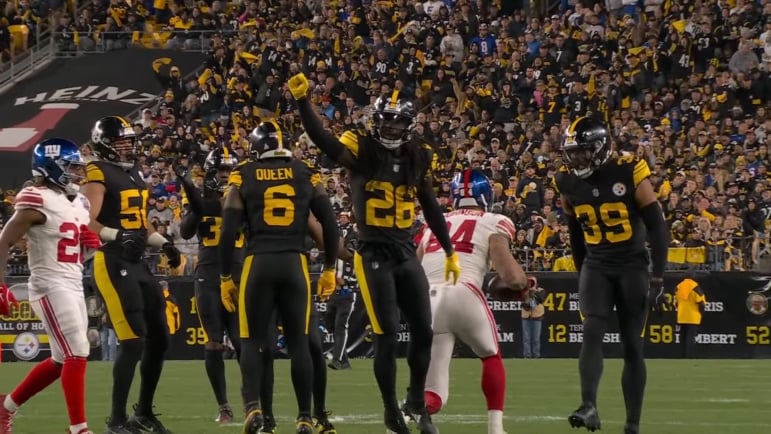Our first charting breakdown of the Pittsburgh Steelers defense of the season. Probably won’t visit it again until the season is over but we’re still checking out all the categories we have in the past. All the nuggets of information the charting we manually do every week provide us.
– This is out of 476 snaps, excluding the “no plays” that didn’t officially count in the play-by-play.
– Off the top, the Steelers are on pace to be on the field for 1,011 snaps this season. If that holds, it’ll be one of the best marks since we’ve been charting. Here’s where that would stack up with the yearly total, 2015-2023.
2024: 1,011 snaps (59.5 per game) *Projected
2023: 1,136 snaps (66.8 per game)
2022: 1,012 snaps (59.5 per game)
2021: 1,108 snaps (65.2 per game)
2020: 992 snaps (62 per game)
2019: 1,067 snaps (66.7 per game)
2018: 1,021 snaps (63.8 per game)
2017: 979 snaps (61.2 per game)
2016: 1,040 snaps (65.0 per game)
2015: 1,102 snaps (68.9 per game)
– By a single less snap compared to 2022, it would be the fewest Pittsburgh has had in our charting on a per-game basis. Would be more than say, 2020, but that was under the 16-game model. That 2024 is still projected to be less than most of the 16-game seasons speaks volumes to how little this defense is out there for. Playing fresh is key in-game and throughout the season.
– Here’s a look at the broad personnel groupings the Steelers have used this season.
Nickel: 54.2 percent (258 snaps)
3-4: 27.5 percent (131 snaps)
Dime: 17.2 percent (82 snaps)
4-4: 0.8 percent (4 snaps)
Goal Line: 0.2 percent (1 snap)
– Last year, nickel led the groupings but only by a small margin, 37.4 percent versus 3-4’s 34.6 percent. Dime sat at 22 percent. Much more nickel-dominant this year, though the Steelers playing with the lead and being 6-2 is a factor. Forces teams to pass late. Still, we’ll see how these numbers flow the rest of the year and if things even out. Or if base becomes a smaller part of the team’s packages.
– Here are the specific groupings and snap counts.
Base Nickel – 253 snaps
Base 3-4 – 126 snaps
Dime – 72 snaps
Amoeba – 10 snaps
3-4 Over – 5 snaps
Big Nickel – 4 snaps
4-4 – 4 snaps
Goal Line – 1 snap
Nickel Over – 1 snap
The “Amoeba” is their 1-4-6 grouping. Their over front has the d-line shifted to the strength of the formation. Big Nickel has three safeties instead of three corners. Not used often this year after seeing 47 snaps last season but Damontae Kazee’s injury may have limited the Steelers when they could’ve used it a lot against a team like the Las Vegas Raiders.
– Here are the overall base/sub-package groupings. Goal line won’t be in either category.
Sub-package: 71.6 percent (340 snaps)
Base: 28.4 percent (135 snaps)
Last year was a much closer gap. Sub-packages at 59.4 percent, base at 40.3 percent. Again, the Steelers’ success is influencing the data, but this is a wide margin. Here are the year-by-year rates.
2023
Sub: 59.4 percent
Base: 40.3 percent
2022:
Sub: 68.2 percent
Base: 31.8 percent
2021:
Sub: 64.4 percent
Base: 35.6 percent
2020:
Sub: 60.1 percent
Base: 39.9 percent
2019:
Sub: 68.5 percent
Base: 31.3 percent
2018:
Sub: 68.4 percent
Base: 31 percent
2017:
Sub: 61.1 percent
Base: 38.8 percent
2016:
Sub: 70.5 percent
Base: 28.7 percent
2015:
Sub: 71.3 percent
Base: 27.4 percent
– Should the 71.6-percent figure hold, it would be an all-time high in our charting and look more similar to 2015/2016 than the last few seasons. Last year, the Steelers’ base rate was the highest we’ve ever tracked.
– Pittsburgh’s seemingly lack of blitzes has been talked about a lot this year. So what’s the number and how does it compare? It sits at 22.2 percent. That’s down about nine points compared to last season. Here’s the yearly numbers.
2014: 28 percent
2015: 33.3 percent
2016: 39.7 percent
2017: 33.2 percent
2018: 44.1 percent
2019: 33.5 percent
2020: 35.6 percent
2021: 26.1 percent
2022: 27.9 percent
2023: 31.2 percent
2024: 22.2 percent
If that number holds, it’ll be the Steelers’ lowest percentage since we’ve been charting by nearly four points. The previous low came in 2021 when they sat at 26.1 percent.
– Here are their game-by-game blitz rates.
Week 1 Falcons – 11.1 percent
Week 2 Broncos – 29.7 percent
Week 3 Chargers – 24 percent
Week 4 Colts – 25.8 percent
Week 5 Cowboys – 14.3 percent
Week 6 Raiders – 20 percent
Week 7 Jets – 25.6 percent
Week 8 Giants – 26.2 percent
Probably no serious takeaways from that breakdown. The blitz rate has come up a little bit the last three weeks, but it’s yet to crack 30 percent in any game.
– Sending five or more rushers, the Steelers have done so 20.1 percent of the time. Again, we’ll compare that to previous years.
2015: 33.6 percent
2016: 27.7 percent
2017: 19.5 percent
2018: 36.0 percent
2019: 34.3 percent
2020: 38.9 percent
2021: 22.7 percent
2022: 28.2 percent
2023: 30.0 percent
2024: 20.1 percent
Second-lowest mark only ahead of 2017 (19.5 percent). And a 10-percent falloff compared to a year ago. The Steelers have been about rushing four and dropping seven, doing so 79.5 percent of the time this season.
– Let’s jump into the position groups.
Defensive Line
Pressures
Cam Heyward: 19
Keeanu Benton: 9
Larry Ogunjobi: 8
Isaiahh Loudermilk: 3
Montravius Adams: 2
DeMarvin Leal: 2
Dean Lowry: 1
Snaps per pressure. The lower the number, the better.
Cam Heyward: 10.2
DeMarvin Leal: 13.5
Isaiahh Loudermilk: 14
Keeanu Benton: 16.0
Larry Ogunjobi: 21
Dean Lowry: 25
Montravius Adams: 35.5
Injured last year, Heyward’s number came in at 30.1. Major difference and he’s back to his old self. Better, even. In 2022, he sat at 11.5. In 2021, 13,0, and in 2020, it was 15.1. Aging like a fine wine.
Nice number for Loudermilk in limited reps. Benton’s number is similar to last year (15.3) but the sacks aren’t there. Ogunjobi has seen a slight uptick from his 27.4 a year ago.
– Though it comes as little surprise, the Steelers are much better stopping the run out of their 3-4 front (3.0 YPC allowed) than nickel (4.9 YPC).
– One true d-lineman has dropped into coverage this year. That was Dean Lowry against the Giants, which you can see here. EDGE/DL DeMarvin Leal also dropped once but he’s a hybrid player and that came while playing as a hand-down outside linebacker.
– It’s interesting there hasn’t been a big drop-off or change when any lineman is or is not on the field. The numbers are pretty similar. For example, when Heyward is on the field, the Steelers allow 4.2 YPC. When he’s off, they allow 3.8. That’s a broad number that shouldn’t be directed at just Heyward, and the difference isn’t stark anyway.
The big change is Keeanu Benton as the Steelers allow 3.3 YPC when he’s on the field and 5.3 when he’s off it. But that can be attributed to him being in base and the run defense being naturally stronger.
Linebackers
Pressures
T.J. Watt: 21
Alex Highsmith: 18
Nick Herbig: 9
Patrick Queen: 4
Payton Wilson: 3
Elandon Roberts: 3
Jeremiah Moon: 2
Ade Ogundeji: 1
Snaps per pressure. Just focusing on the EDGE rushers.
Alex Highsmith: 7.2
Nick Herbig: 8.0
T.J. Watt: 12.0
Ade Ogundeji: 18
Jeremiah Moon: 25.5
Highsmith’s rate is absurd and buoyed by the whopping 10 pressures he had against the Giants in Week 8, most coming against LT Chris Hubbard. Herbig’s efficiency continues to be off the charts while Watt remains excellent.
– Drop rate. How often the EDGE players drop into coverage.
Ade Ogundeji: 5.3 percent
T.J. Watt: 6.3 percent
Alex Highsmith: 7.1 percent
Jeremiah Moon: 7.3 percent
Nick Herbig: 14.3 percent
Small sample sizes for Ogundeji and Moon. Last year, Watt was at 8.1 percent and Highsmith at 10.6 percent so we’re getting similar numbers here. Herbig’s rate is higher after dropping 7.7 percent in 2023.
– Numbers when QBs target them.
Alex Highsmith: 1/3 4 yards 0 TDs 0 INTs
T.J. Watt: 2/3 9 yards 0 TDs 0 INTs
Elandon Roberts: 2/3 10 yards 0 TDs 0 INTs
Patrick Queen: 8/10 56 yards 1 TD 0 INTs
Payton Wilson: 9/11 60 yards 0 TDs 0 INTs
– QB rating against
Alex Highsmith: 42.4
T.J. Watt: 70.1
Elandon Roberts: 71.5
Payton Wilson: 89.4
Patrick Queen: 123.3
– Sample sizes are small across the board, and generally linebacker numbers don’t stand out positively unless the targets are minimal. Completion rates are often high. They’re not allowing big plays, which is key.
– Patrick Queen has blitzed 32 times this season.
– As they’ve shown since the preseason, Roberts primarily plays in base while Wilson plays in nickel. Wilson has logged just one snap in the Steelers’ 3-4, a one-off in Week 2 against Denver. For Roberts, 77.4 percent of his reps have come in base. There has been a more recent shift, 28 of his 33 nickel snaps this season coming the last three weeks. Roberts is strong against the run and matches up well when the team is facing talented tight ends and wants a mix of run and pass defense. Six of those snaps have been against 12 personnel against teams like the Raiders.
Secondary
– When targeted:
Cory Trice Jr.: 0/1 0 yards 0 TDs 1 INT
Terrell Edmunds: 1/1 25 yards 0 TDs 0 INTs
Damontae Kazee: 2/4 62 yards 0 TDs 1 INT
James Pierre: 2/5 35 yards 0 TDs 0 INTs
Minkah Fitzpatrick: 11/15 171 yards 1 TD 0 INTs
Joey Porter Jr.: 18/31 233 yards 0 TDs 1 INT
DeShon Elliott: 17/24 123 yards 2 TDs 1 INT
Beanie Bishop Jr.: 16/26 164 yards 1 TD 3 INTs
Donte Jackson: 15/34 226 yards 0 TDs 3 INTs
– QB rating against:
Cory Trice Jr.: 0.0
Donte Jackson: 29.8
Beanie Bishop Jr.: 53.0
Damontae Kazee: 56.3
James Pierre: 64.6
Joey Porter Jr.: 68.4
DeShon Elliott: 92.9
Terrell Edmunds: 118.8
Minkah Fitzpatrick: 132.9
– Again, some smaller sample sizes in players like Trice, who picked off his lone target against Denver. Edmunds has just one and lands on the other side of the list after giving up a seam ball in Week 8.
– New additions Jackson and Bishop have been excellent. Bishop’s interceptions and bounces his way have helped out his numbers but the other numbers are generally positive. Elliott’s two scores allowed and one tough game against Dallas ding him.
– Minkah Fitzpatrick is normally at the top of the list. Here, he is at the very bottom. His play is certainly better than this and just 15 targets speak to teams throwing away from him, but this is a place on our list he’s not used to sitting.
– One positive stat regarding Fitzpatrick’s usage. After being in the box over 20 percent of the time last year, Fitzpatrick has been in the box just 1.3 percent of the time in 2024. That’s where he should be and aided by Elliott’s presence. He’s been in the box 36 percent of the time.
– Few slot blitzes this year with Bishop. Not his strength. Only five this season and only one since Week 5. He does have a pressure and half-sack from these rushes, though.
– SS DeShon Elliott has blitzed more often, 13 times.








